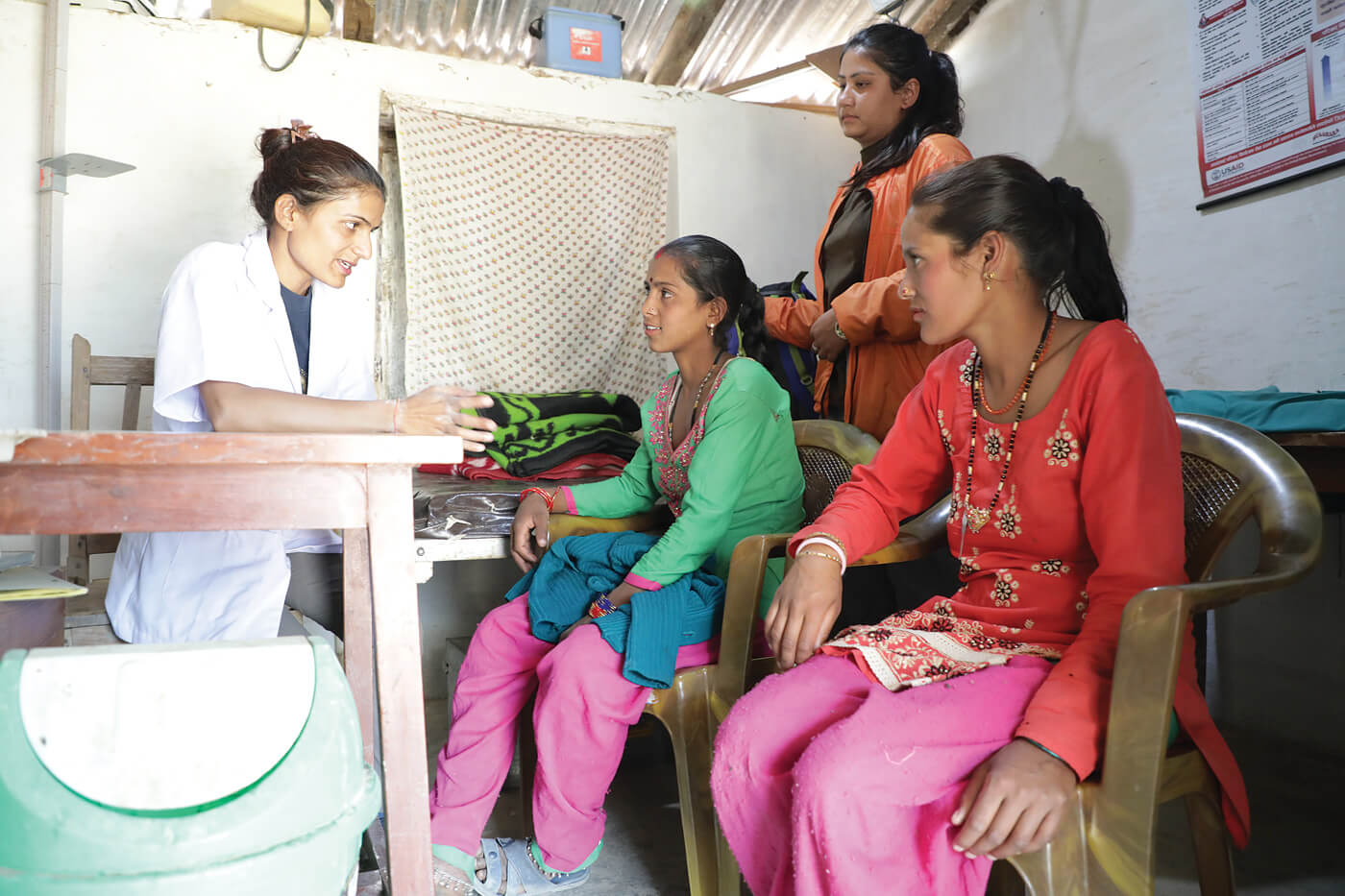Two nurses visiting distant Maharudra Health Post in Baitadi had packed up, said goodbye to staff and started down the road when two local women waved down their jeep. “We want to have an implant,” they said.
The nurses told the women they would be back next week, but they insisted: “We have walked three hours, leaving our breastfed babies to get our implants.” The nurses relented, the jeep turned around and returned to the health post.
The local women were lucky. Only half of health facilities in Nepal provide all five major contraceptives as part of their regular services. Implants and long acting reversible contraceptives (LARC) are not easily available, mainly due to lack of trained staff. Filling that gap are visiting service providers at remote health posts like this one in Baitadi.
Only 43% of all married women of reproductive age in Nepal have access to modern contraceptives, according to the Demographic Health Survey (DHS) 2016 report. Although it was only 26% in 1996, there is still a huge unmet need for family planning.
Nepal’s population clock will touch 30 million next month, but the country’s falling fertility rate means that population will stop growing in three decades after it reaches 37 million. A Nepali woman on average had 6 babies in the 1960s, now she has 2, which is below the population replacement level.
The two women who stopped the nurses were Hasa Sarki, 23, and her sister Harina, 20 (pictured, right). Hasa already has four children, and Harina has two. The sisters live in the same house in Lakhulla village, about three hours walk from the health post.
“When we heard the implant nurses were here, we took off, leaving our food and shouting to my husband to take care of the baby,” said Harina.
The sisters are Dalits from a community of subsistence farmers. Hasa was married at 15 and already has three daughters and a son. The land does not provide food for the family, so Hasa’s husband goes to India six months a year.
“My husband and I decided to have five years’ pregnancy prevention as we can’t afford to have any more children. I am so happy that after today I will be safe for five years,” added Hasa.
One of the nurses, Binda Saud, says the number of women requesting contraceptives even in these remote areas is growing, but the one medic trained in inserting implants was transferred and there is no one to do it in the health post. Which is why the government has mobilised 63 visiting service providers (VSP) in 14 districts across Nepal to promote implants and IUCDs, with support from the UN Population Fund and British agency DFID.
Lack of personnel trained in implants is just one barrier in remote villages, where many people still believe that birth control is against god’s wishes. As a result, women give birth annually and many are anaemic, malnourished, and some die.
“One of the worst cases I have faced is that of a woman who had seven children who told me she wanted five years’ protection, but when I started the process of putting an implant into her arm she started shaking and saying god will not forgive her; she changed her mind,” recalled the other auxiliary nursing midwife, Madhavi Bhatta.
There are families in these remote mountains where mothers and their daughters-in-law give birth together. Laxmi BK, 37, and her daughter-in-law Puja BK, 19, gave birth within months of each other. Laxmi was married when she was 14, and now has 8 children, including the youngest who is 18 months. Puja got married when she was 16, and gave birth to her first child a year ago.
“I don’t know much about contraception, I used an injection once but it led to bleeding and I thought I would die, so I decided never to use it again,” Laxmi said.
The VSP approach was piloted by the government in Ramechhap district in 2015, and after positive results was expanded in 2018.
“It is a cost-effective way to substantially increase the uptake of five modern family planning methods in areas of low use and high unmet demand for contraception,” explained Amit Dhungel of UNFPA Nepal.
The government is also encouraged by the success of the initiative, especially for delivery of family planning. “VSPs travel to remote areas which are difficult for the government to reach,” said Kabita Aryal at the Department of Health in Kathmandu. “That fills the gap in health facilities and health workers.”
Getting the right contraception in the right place at the right time can change a Nepali woman’s life. That hope could be seen in the smiles on the faces of Hasa and Harina Sarki last month as they hurried home to their families with their new implants.
Kalawati Chand, 31, from Khaligad village in Baitadi, (above) received an implant at a VSP camp two years ago, and says it is a big relief not to be worried about getting pregnant.
“I already had two abortions, and I used to get pregnant every year, which means I was not able to focus on my children and even the farm. This had led to discord in the family,” Kalawati said. “But now I have more time for my children, husband and to go to the fields. We are happier now.”
Setu Mahata, 26, (below) was waiting at Udayadev Health Post in Baitadi, a 1.5 hour walk from her home recently. The mother of two had been taking pills, but she heard that a VSP was coming and wanted to get a 5-year protective implant.
“It is really convenient that the nurse comes here, otherwise I would have to spend two days going to another health post, and that would be expensive,” she said.
